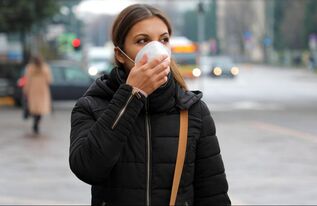COVID-19 Related PTSD and Anxiety
|
The COVID-19 pandemic has had a profound impact on nearly every aspect of our lives, including our mental health. We are more at risk during this pandemic than ever before and therefore more likely to experience anxiety or exposure to a traumatic event. Many of us, especially healthcare providers, first-responders, and essential workers, are therefore at increased risk for developing post-traumatic stress disorder and unhelpful anxiety related to the COVID-19 pandemic.
COVID Related PTSDPost-Traumatic Stress Disorder (PTSD) results from witnessing or being exposed to death, threatened death, or actual or threatened serious injury. Symptoms include intrusive memories, efforts to avoid memories, increased negative emotions and thinking patterns, and hypervigilance or hyper-arousal (increased alertness and related physical symptoms).
Many healthcare providers and first-responders on the front lines, in addition to patients hospitalized with COVID-19, have had increased exposure to all of the above. Families of 549,000 Americans have experienced the death of a loved one due to this pandemic. Because PTSD is a recovery disorder, a disorder that occurs when traumas cannot be effectively processed and recovered from, we will likely see an increase in PTSD development (Resick et al., 2017). However, research suggests that treatments that have been used to treat PTSD in the past, including Cognitive Processing Therapy, can and will be effective at helping patients recover from the psychological toll of this pandemic. |
COVID Related Health Anxiety
In addition to PTSD, many have developed excessive anxiety and fear surrounding contracting or transmitting the COVID-19 virus. This typically falls within the category of Health Anxiety (also known as Illness Anxiety Disorder), in which individuals feel extremely anxious, preoccupied, and distressed about having or acquiring a serious illness. However, when health anxiety becomes disordered, the anxiety is disproportionate to the actual possible threat. For instance, individuals with Illness Anxiety Disorder may have fears of health conditions without having medical evidence or without being at high risk for developing the feared ailment.
COVID-19 related anxiety has been difficult for many individuals because it often does not seem disproportionate to the possible threat. Instead, we have all been facing a daily risk of contracting a disease that spreads rapidly from person to person and that the CDC has deemed a threat. For this reason, the treatment for health anxiety related to COVID-19 does not target extinguishing fear of the virus. Instead, we are here to help you learn strategies to keep COVID-19 related anxiety within normative and situationally appropriate ranges. For instance, when you are not facing a direct COVID-19 related threat (such as the threat of going to a crowded space or longstanding exposure to a new individual without appropriate PPE), extreme, constant COVID related anxiety is likely not helpful or situationally warranted.
COVID-19 related anxiety has been difficult for many individuals because it often does not seem disproportionate to the possible threat. Instead, we have all been facing a daily risk of contracting a disease that spreads rapidly from person to person and that the CDC has deemed a threat. For this reason, the treatment for health anxiety related to COVID-19 does not target extinguishing fear of the virus. Instead, we are here to help you learn strategies to keep COVID-19 related anxiety within normative and situationally appropriate ranges. For instance, when you are not facing a direct COVID-19 related threat (such as the threat of going to a crowded space or longstanding exposure to a new individual without appropriate PPE), extreme, constant COVID related anxiety is likely not helpful or situationally warranted.
What is the Treatment for PTSD Related to COVID-19
Cognitive processing therapy (CPT) and Prolonged Exposure Therapy (PE) are treatments that have been demonstrated to be highly effective for treating PTSD resulting from a variety of traumas.
Cognitive Processing Therapy (CPT):
Cognitive processing therapy (CPT) aims to assist in challenging unhelpful thoughts and beliefs that have resulted from a trauma. Additionally, this treatment aids in processing the traumatic memory and related emotions. By modifying beliefs related to the trauma and by effectively processing (as opposed to avoiding) the traumatic memory, patients recover from their traumatic experience. This 12-session treatment has been validated for COVID-related medical trauma (Murray et al., 2020) and has been recommended by the American Psychological Association for healthcare workers during the COVID-19 pandemic (Kröger, 2020). Given the devastating effects the COVID-19 pandemic has had on our sense of safety, responsibility, and control, in addition to our ability to connect to others, this treatment appears effective at helping patients recover from PTSD related to the pandemic.
Prolonged Exposure Therapy (PE):
Prolonged Exposure Therapy (PE) aims to assist patients with gradually processing traumatic memories and challenging avoidance related to their trauma. One symptom of PTSD is avoidance of both the traumatic memory and situations, people, and places related to the traumatic event. This treatment is tailored to assist in recovery through challenging this avoidance and helping patients to re-enter their lives. This treatment has been validated for treating medical traumas (Foa et al., 2007). It should be noted that we will continue adapting this treatment to help patients challenge avoidance of situations, people, places, etc. without increasing your risk of COVID-19 transmission.
Cognitive Processing Therapy (CPT):
Cognitive processing therapy (CPT) aims to assist in challenging unhelpful thoughts and beliefs that have resulted from a trauma. Additionally, this treatment aids in processing the traumatic memory and related emotions. By modifying beliefs related to the trauma and by effectively processing (as opposed to avoiding) the traumatic memory, patients recover from their traumatic experience. This 12-session treatment has been validated for COVID-related medical trauma (Murray et al., 2020) and has been recommended by the American Psychological Association for healthcare workers during the COVID-19 pandemic (Kröger, 2020). Given the devastating effects the COVID-19 pandemic has had on our sense of safety, responsibility, and control, in addition to our ability to connect to others, this treatment appears effective at helping patients recover from PTSD related to the pandemic.
Prolonged Exposure Therapy (PE):
Prolonged Exposure Therapy (PE) aims to assist patients with gradually processing traumatic memories and challenging avoidance related to their trauma. One symptom of PTSD is avoidance of both the traumatic memory and situations, people, and places related to the traumatic event. This treatment is tailored to assist in recovery through challenging this avoidance and helping patients to re-enter their lives. This treatment has been validated for treating medical traumas (Foa et al., 2007). It should be noted that we will continue adapting this treatment to help patients challenge avoidance of situations, people, places, etc. without increasing your risk of COVID-19 transmission.
What is the Treatment for COVID-19 Related Health Anxiety
Cognitive-Behavioral Therapy (CBT)
Cognitive-behavioral therapy is an effective and safe treatment for Health Anxiety. The goal of CBT for health anxiety is to help alter unhelpful ways of thinking and reduce or eliminate the avoidance, checking, safety-behaviors, etc. that maintain the individual's health-related fears (Abramowitz & Braddock, 2011). In doing so, the individual can learn that they are over-estimating the likelihood of having/ acquiring an illness and that they can tolerate and effectively manage their emotions and potential feared consequences. We will adapt this treatment to help you manage anxiety related to the COVID-19 pandemic. Particularly, we will provide strategies for thinking in more realistic ways and help you reduce unhelpful and excessive checking behaviors related to COVID-19. For instance, if patients are endorsing constant fears that they have contracted COVID-19 and engage in frequent symptom checking, we will assist in developing more realistic thoughts about your level of risk.
Because our goal is to help patients get relief from excessive fears related to COVID-19, we also apply exposure based techniques to help you sit with this fear without increasing your risk of exposure. We will do so by helping you learn to tolerate the thought of COVID-19 transmission in order to learn that thinking about COVID-19 or having certain physical sensations does not equate to actually having it. By sitting with such fears, patients are able to develop a more realistic understanding of when it is or is not helpful to think about this virus and to develop more realistic ways to protect themselves from this threat. As the vaccine is rapidly administered, we are here to help you assess the next steps in managing this pandemic according to the CDC guidelines.
Cognitive-behavioral therapy is an effective and safe treatment for Health Anxiety. The goal of CBT for health anxiety is to help alter unhelpful ways of thinking and reduce or eliminate the avoidance, checking, safety-behaviors, etc. that maintain the individual's health-related fears (Abramowitz & Braddock, 2011). In doing so, the individual can learn that they are over-estimating the likelihood of having/ acquiring an illness and that they can tolerate and effectively manage their emotions and potential feared consequences. We will adapt this treatment to help you manage anxiety related to the COVID-19 pandemic. Particularly, we will provide strategies for thinking in more realistic ways and help you reduce unhelpful and excessive checking behaviors related to COVID-19. For instance, if patients are endorsing constant fears that they have contracted COVID-19 and engage in frequent symptom checking, we will assist in developing more realistic thoughts about your level of risk.
Because our goal is to help patients get relief from excessive fears related to COVID-19, we also apply exposure based techniques to help you sit with this fear without increasing your risk of exposure. We will do so by helping you learn to tolerate the thought of COVID-19 transmission in order to learn that thinking about COVID-19 or having certain physical sensations does not equate to actually having it. By sitting with such fears, patients are able to develop a more realistic understanding of when it is or is not helpful to think about this virus and to develop more realistic ways to protect themselves from this threat. As the vaccine is rapidly administered, we are here to help you assess the next steps in managing this pandemic according to the CDC guidelines.
If you are interested in counseling for COVID related trauma and/or anxiety symptoms, call us at 630-570-0050 or 779-201-6440 or email us at [email protected]. We have counselors, psychologists, and social workers available to help you at one of our locations in North Aurora, IL, Sycamore, IL, and/or via Telehealth Online Therapy Services.
OakHeart COVID Related Trauma and Anxiety Counselors, Psychologists, and Social Workers
|
|
|
|
|
|
|
|
|
COVID-19 Related Blogs:
|
The COVID-19 pandemic has had a profound impact on nearly every aspect of our lives, including our mental health. Many individuals, especially healthcare workers, first responders, and patients hospitalized with COVID-19, have been traumatized throughout this pandemic. With increased uncertainty and the omnipresent threat of COVID-19, many individuals have felt overall more anxious about their life, health, future, and world. We have seen a national rise in substance use, depression, relationship difficulties, and school challenges (Horigian et al., 2020). We are grieving the loss of almost a million Americans. We are processing the loss of our social freedoms and the immense impact of isolation...(To read more, click on the link above).
|
Resources
References
Abramowitz, J. S. & Braddock, A. E. (2011). Hypochondriasis and Health Anxiety: Advances in Psychotherapy Evidence-Based Practice. Hogrefe.
Foa, E. B., Hembree, E. A., & Rothbaum, B. O. (2007) Prolonged Exposure for PTSD: Emotional Processing of Traumatic Experiences: Therapist Guide. Oxford University Press.
Kröger, C. (2020). Shattered social identity and moral injuries: Work-related condition in health care professionals during COVID-19 Pandemic. Psychological Trauma: Theory, Research, Practice, and Policy, 12(S1), S156-S158. http://dx.doi.org/10.1037/tra0000715
Murray, H., Grey, N., Wild, J., Warnock-Parkes, E., Kerr, A., Clark, D. M., & Ehlers, A. (2020). Cognitive therapy for post-traumatic stress disorder following critical illness and intensive care unit admission. The Cognitive Behaviour Therapist, 13, 1-17. 10.1017/S1754470X2000015X
Resick, P. A., Monson, C. M., & Chard, K. M. (2017). Cognitive Processing Therapy for PTSD. The Guilford Press.
Foa, E. B., Hembree, E. A., & Rothbaum, B. O. (2007) Prolonged Exposure for PTSD: Emotional Processing of Traumatic Experiences: Therapist Guide. Oxford University Press.
Kröger, C. (2020). Shattered social identity and moral injuries: Work-related condition in health care professionals during COVID-19 Pandemic. Psychological Trauma: Theory, Research, Practice, and Policy, 12(S1), S156-S158. http://dx.doi.org/10.1037/tra0000715
Murray, H., Grey, N., Wild, J., Warnock-Parkes, E., Kerr, A., Clark, D. M., & Ehlers, A. (2020). Cognitive therapy for post-traumatic stress disorder following critical illness and intensive care unit admission. The Cognitive Behaviour Therapist, 13, 1-17. 10.1017/S1754470X2000015X
Resick, P. A., Monson, C. M., & Chard, K. M. (2017). Cognitive Processing Therapy for PTSD. The Guilford Press.











